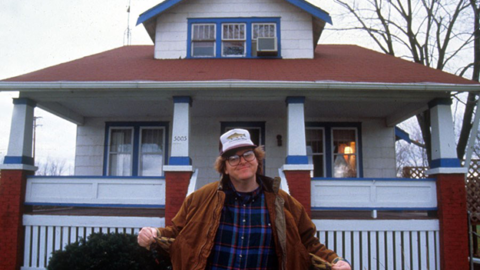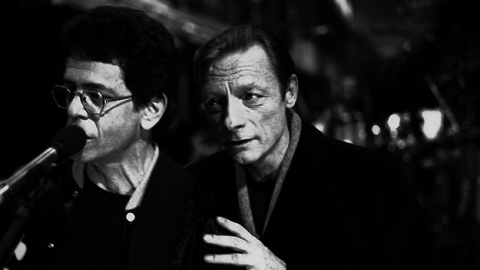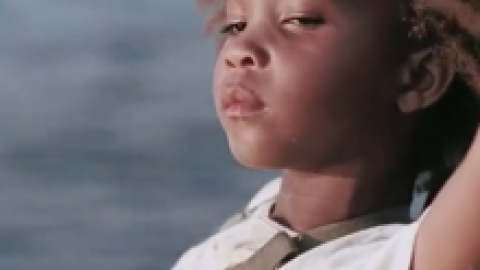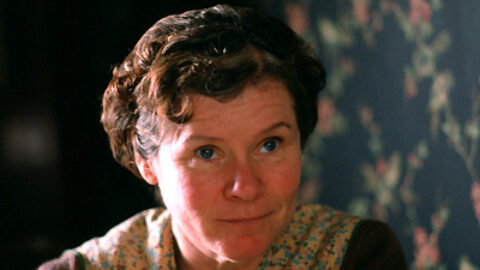By Amy Taubin in the January-February 2011 Issue
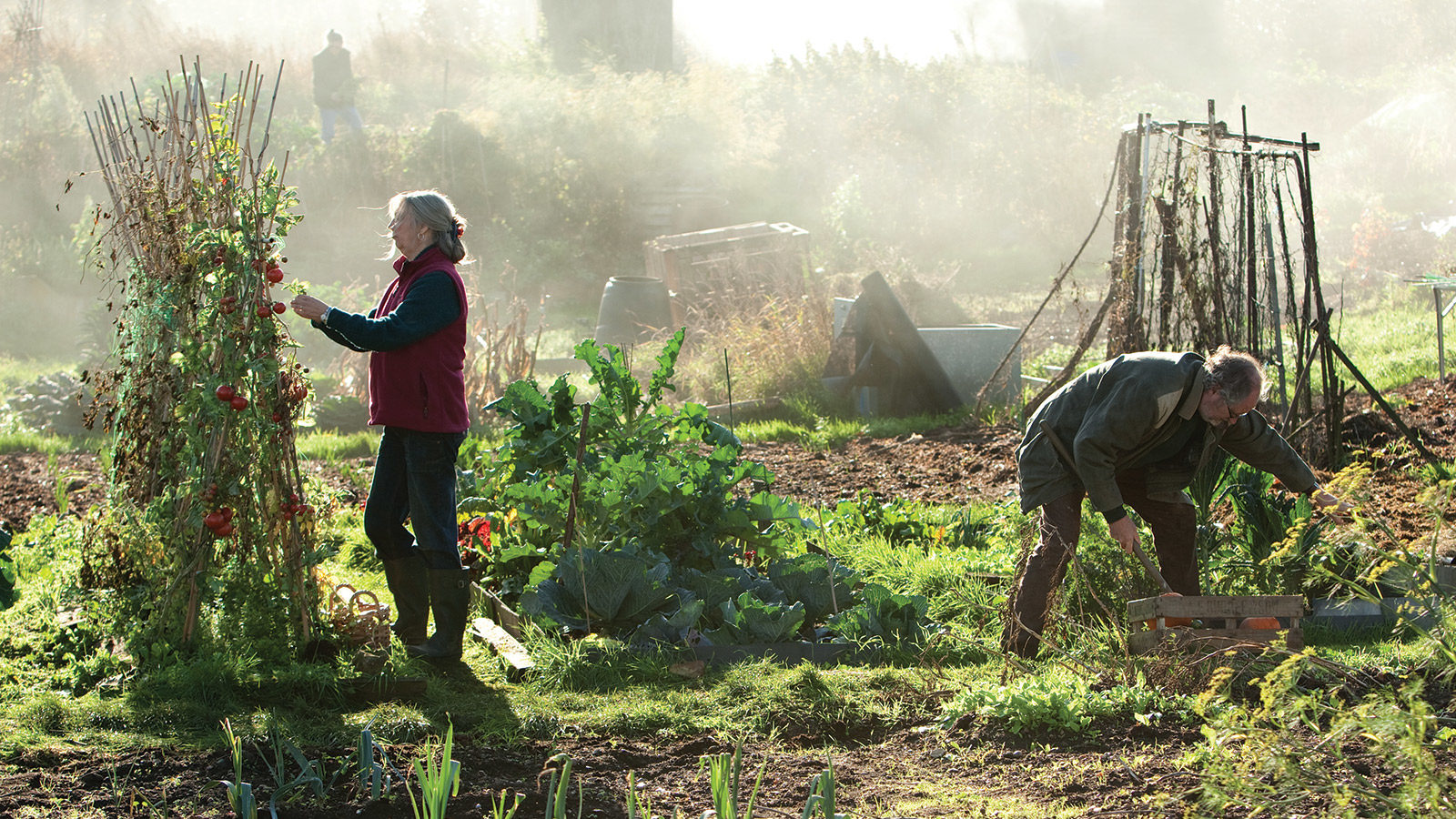
The Best of Possible Worlds
Amy Taubin talks house and garden with Mike Leigh
Mike Leigh’s Another Year is a rare film in that it focuses on a happily married couple nearing retirement age. Tom (Jim Broadbent), a geologist, and Gerri (Ruth Sheen), a psychotherapist, have been together since college. They live in a lovely suburban house and derive a great deal of pleasure from tending their garden. Could anything be less dramatic or more heartening? Perhaps because of their shared equanimity, Tom and Gerri act as a magnet for some very unhappy people, among them Ken (Peter Wight) a longtime friend, and Mary (Lesley Manville) who works as an office assistant to Gerri’s medical group. Lonely and terrified of losing her youth, Mary comes to depend on Tom and Gerri’s friendship to a degree the couple has never encouraged. If Tom and Gerri are the film’s center, Mary is its energy—most of it negative. Leigh has finally given Lesley Manville a role that makes big demands on her expressive range, and she rises magnificently to the occasion.
This interview with Mike Leigh took place this past November. Because Leigh’s method of working with actors and creating his films out of improvisation is well known, it is almost entirely excluded from the discussion.
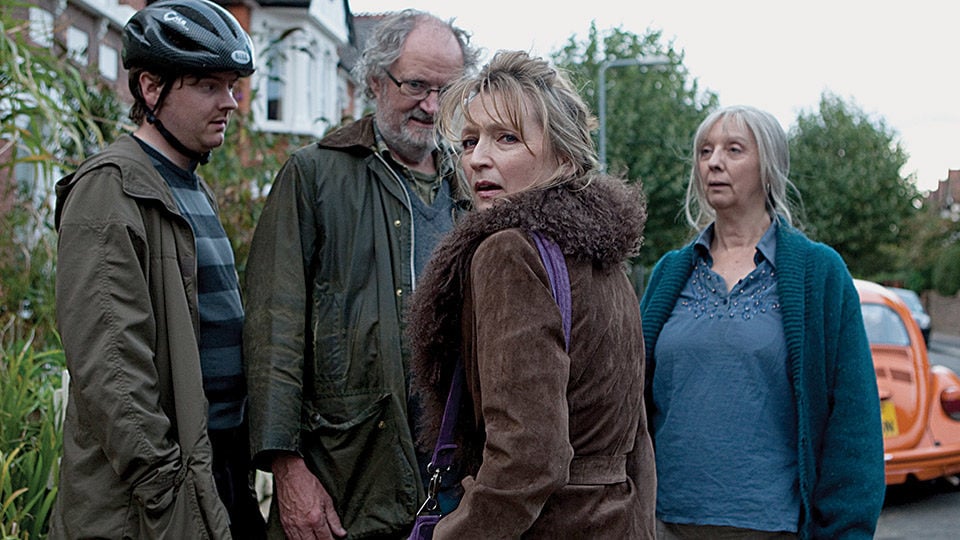
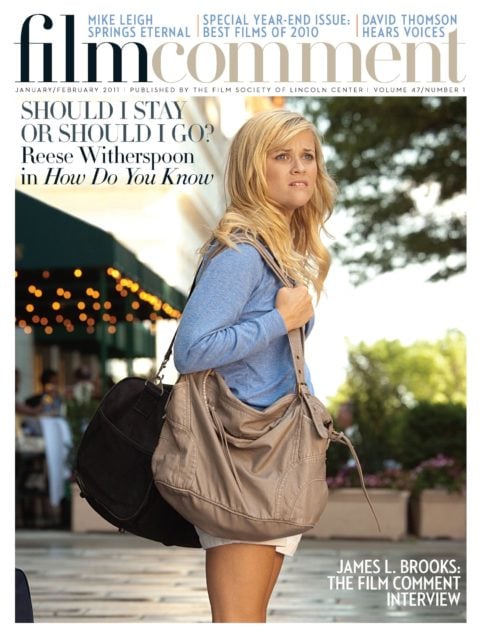
From the January-February 2011 Issue
Also in this issue
I think Another Year is the most Chekhovian of your films. It has something to do with the film being structured around the four seasons, and the importance of Tom and Gerri’s garden. They don’t live in a country house, as in The Cherry Orchard or the other plays, but the attention they pay to growing vegetables on their allotment or community garden makes it seem as if they do. Also, there is a great deal of talk about happiness and unhappiness.
Much as I’m a great admirer of Chekhov and I do regard him as an ancient influence in some way, I never really thought about Chekhov until we’d made the film and people started to make this observation. I can certainly resonate with and indeed am flattered by the comparison. You haven’t actually used the word “rural,” but you’re sort of talking about that. Generally speaking, this one is an urban film about urban people—well, suburban, obviously—but it is about an urban spirit. But the allotment and its currency in the film becomes a metaphor for nurturing, and in that sense for the cyclical nature of life, obviously.
So the allotment is a short car ride from their house?
Absolutely. During the development of the film when I was creating the world with the actors and all the rest of it, I did run into a couple of narrative and dramatic conundrums. One of which was how to dramatize Tom and Gerri’s green, nurturing, planet-caring thing. We’d got the notion that they had an allotment, but I couldn’t quite see how to make that interesting. I was also looking for how to open up the narrative potential of Mary’s occasional visitations to Tom and Gerri, given that she is actually in the end, quite a peripheral person in their lives, but the kind of person who insists her way into your life if you let them. And since my films ordinarily have quite a short dramatic time span—you know, a week, a few days, a month maybe—that was presenting a problem.
And then the third thing that happened was that I hit the point that I always do, where I need to sit down with Dick Pope, the cinematographer, and the designers to share with them some notion as to the film that’s going on in my head so that we can start to talk about the look of the film, and so that Dick can shoot tests of some kind. With Happy-Go-Lucky [08], I talked about Poppy’s explosive personality and we agreed it should be bright colors. With Naked [93], I talked about its bleak, nocturnal, solo journey and we arrived at a palette by shooting tests that was monochromatic and dark. I wasn’t quite as clear talking about this film because it’s so complex. Dick said, “I get the spirit of it. I will shoot some footage as a test.”
What he shot was four different visual options, four looks. When I looked at them, it suggested to me the idea of four seasons, which totally opened up the film and tapped into what I was actually trying to say with it, which is obviously, that metaphor of life. It made it possible to dramatize the allotment in an interesting way and it opened up a longer time span, so that we could explore visitations from Mary. And it liberated each season, each chapter, each act of the film so that I could have a different mood, a different prevailing spirit, and start from a different angle and introduce a new character. And that, perhaps, is what also may give it a Chekhovian feel.
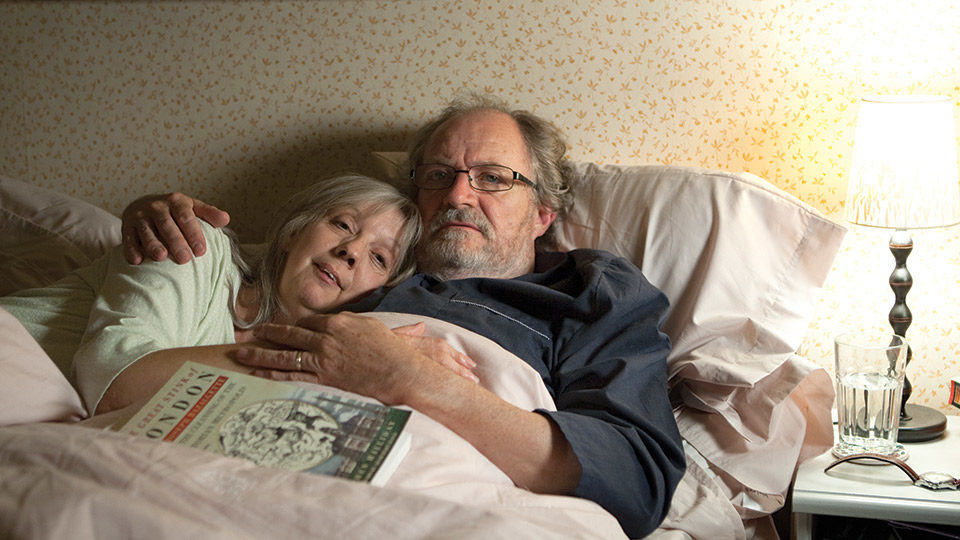
Although this may be true of some of your earlier films as well, I thought that there was a strong subtext about alcoholism. It begins in the first scene where the extremely depressed woman [Imelda Staunton] is talking to the doctor in the clinic where Gerri works, and she says that she doesn’t drink, but her husband does. And then of course Mary is an alcoholic, as is Ken [Peter Wight], Tom and Gerri’s longtime friend.
I don’t think it’s a new issue in my films. You could go right back to the first, Bleak Moments, which I now realize has quite a number of things in common with Another Year. But alcoholism is not about alcohol, it’s about pain. We know that people are driven to alcohol because of the pain, and it’s the pain that we’re talking about.
You also give us Tom and Gerri, who seem to be quite happy…
Well, they’re happy in a real way, as far as it goes.
But the question is to what extent will they or should they make interventions in the lives of the unhappy people who look to them for solace or support.
I think it’s wrong to talk about Tom and Gerri, as some have, in terms of them sitting on the fence and not intervening in any circumstances. I don’t think that’s true. It only really crops up with Mary. With Ken, who is clearly much closer to them than Mary ever was because he is an old friend from way back, they really are concerned and proactive and clearly want to take responsibility for him in some ways, though they still feel helpless because it is a difficult and long-distance situation. The moral dilemma they have in relation to Mary is where you draw the line, particularly when someone oversteps the mark and abuses friendship. And also, from Gerri’s point of view, it’s a professional issue. I think it’s important, when toward the end, Gerri says, “You need help, I’ll talk to one of my colleagues.” Some people have said if Gerri thinks Mary needs help, why doesn’t she get her help. But as a professional, you don’t counsel one of your friends. And also I think people have misread the end of the film. Some people have suggested that Tom and Gerri, not least Gerri, are cold and unsympathetic to Mary toward the end. I think that it’s important that people remember that when, in the last act, Mary shows up at the house, she does so at an extremely inopportune moment because they have got their bereaved brother-in-law there, and they are going to have a private and very special family event, and it just is a damn nuisance when somebody shows up at the wrong moment, uninvited. Given that, I think they’re pretty sympathetic to not throw her out. They ponder it, but they don’t because they can’t and she’s there at the table. But that leaves us with a great complexity and that’s how the film ends.
I did not read them as unsympathetic, I mean, I thought they had extraordinary patience.
More than you and I would have.
Yes, indeed. Your last film, Happy-Go-Lucky, was so much about that character’s determination to be happy. She seems to have lucked out in that she had the DNA for happiness. In Another Year, it seems that the majority of people don’t have that enormous will or those genes. And it also seems tied to the issue of aging and feeling that certain options are closed down or, even if you are with a partner, that one person will die before the other.
This is true. It is about looking back with either joy or regret, looking forward with warmth and optimism or into a black hole of terrifying horror. And that is indeed what the film is about.
Looking back at the performances these same actors have given in your previous movies is a way to see all the individual films as one extended movie. We bring their histories in your movies to each succeeding movie.
I absolutely would agree with what I think you’ve just said, which is that the films are all very different from each other within my, as it were, “genre,” but at the same time there’s no question that it is one long continuous film, there really is.
And what would you say that “genre” is?
Well, that is just my mode of film, I mean no more than that. I’m merely talking about that particular combination of realism and some kind of heightened eccentricity and my take on the world, and the relationship between form and content, between a very disciplined and restrained kind of shooting in relation to an organic exploration of situations, and truthful and courageous performances.
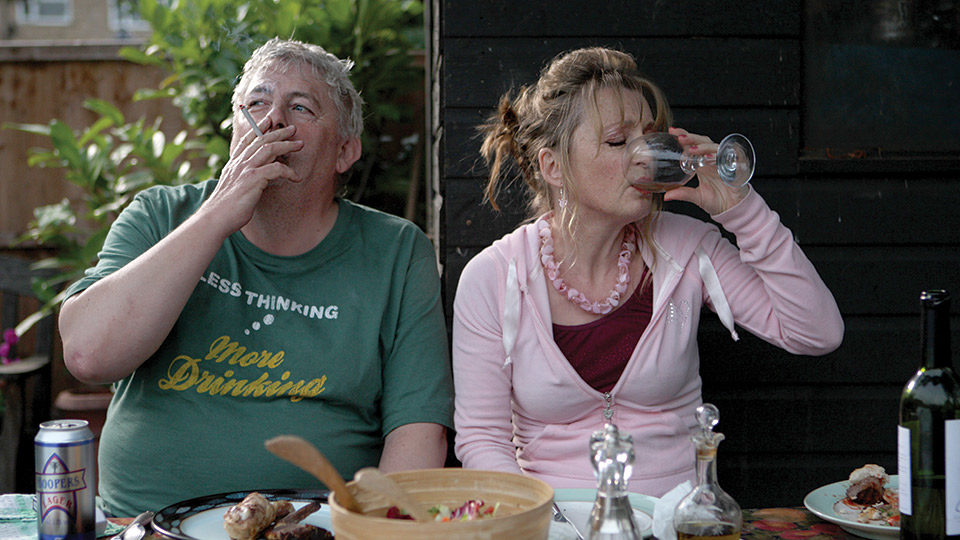
What is also classical is your use of music. Could you talk a little bit about that?
The first three films, Bleak Moments, Hard Labor, and Nuts in May, didn’t have music at all. And two later films, Who’s Who and Grown-Ups, didn’t either. And at first, although I was greatly inspired by many a film that did have music, my feeling was that music was unnecessary and would, in some way, clutter the proceedings for my own purposes. And I think that’s quite an interesting and important place for me to have been at in the beginning when I was formulating my sort of style and finding out how to make my own films. But of course, it has become central. I think the most important thing to begin with is to say is that the five composers I’ve worked with—principally Andrew Dickson and, more recently, Gary Yershon, but also including Rachel Portman, Carl Davis, and in the case of Career Girls, Marianne Jean-Baptiste and Tony Remy, who did the only jazz and the only electronic music track that I’ve had—all start off with an emotional response to the film. In other words, this is not detached music, this is not clinically applied music. It comes from a real gut response to the mood and spirit of the film. And apart from Career Girls, I really have preferred to work with composers who use live classical instruments. And I work as closely with them as I do with everybody else. The contribution of the composers is always very personal and original for them, but the input from me is also very personal and there is a certain kind of spirit and style in the music, which is very much music of my taste, really. In this film, there’s quite a substantial passage toward the end where there isn’t any music. We had sketched in possible cues, but in the end the music is of course the stronger for being balanced with the silences or the passages where you don’t have music. If you plaster music all over a film it simply anesthetizes the whole experience.
In most movies, music cues the audience’s emotions and covers the insufficiency of the actors—the difficulty they have expressing emotions or sustaining a tone. In your films, the performances are so emotionally rich and have such clarity in terms of tonal shifts. Lesley Manville is extraordinary at playing two different emotions or desires at once. It’s staggering when she does that. I always ask myself why you would think you need music when you have that.
Music brings out the flavor. It adds to that. It enhances it. I couldn’t agree more that music, when it’s illustrational or compensatory is awful. But I hope that in these films that the music doesn’t do that.
It doesn’t.
Do you have a favorite film of mine?
Hard. But I think Naked and Topsy-Turvy still. And they both seem like anomalous films. They also—and this is a weakness on my part—have the most to do with a kind of glamour one expects in a movie.
Yes, and both of them subvert that glamour in some way.
And I love Meantime for Gary Oldman and Tim Roth when they were young and innocent as actors. Which films do you like most?
Oh, it’s much harder for me to say. Although I’ve got a great soft spot for Meantime for some reason which I’m never quite sure about. And I’m so astonished by Topsy-Turvy when I see what we achieved, apart from anything else, with such limited resources.
It seemed to me that Another Year must have had something to do with the death in 2009 of Simon Channing Williams [Leigh’s long-time producer]. You dedicated the film to him.
Yes, I think that’s absolutely true. The sense of loss that I and many people involved with this film felt certainly informs the film to some degree. But over and beyond that, it’s a deeply personal film in terms of relationships and loneliness and other things. Let me add to what I’ve said. I wanted it to be very much an homage to Simon and it feels an appropriate film to be that . . . Let me go back. I picked up something interesting you said about Lesley Manville’s performance, that she does contrasting emotions simultaneously. What we’ve tried to do, and I think she pulls it off brilliantly, is this: her character behavior is such that it enables you to see the woman she is at the same time as the young woman she once was and who she’s desperately trying to hang on to, and also the old woman that she’s terrified of becoming. You can see all of those things on different behavior levels within her performance. I think that is worth identifying.
There’s that line in the last scene about her having been a bartender on the beach, and suddenly you see what she looked like at that moment when she thought she had a future that could have gone anywhere. Devastating. I think that some people find that character too painful to deal with.
Too near the bone. I think that’s right. Mary is a victim of many things, but mostly the received propaganda that a woman has to be sexy, a woman has to be gorgeous, and it stitched her up for life. She is not liberated, everything that has happened to her is a function of that misguided, received notion. There’s a bloke somewhere who described the film as misogynist. Which of course reminds me of the reaction in some so-called feminist quarters when Naked came out, that it was regarded as a misogynist film, which is rubbish because it is obviously taking to task such negative aspects of male behavior.
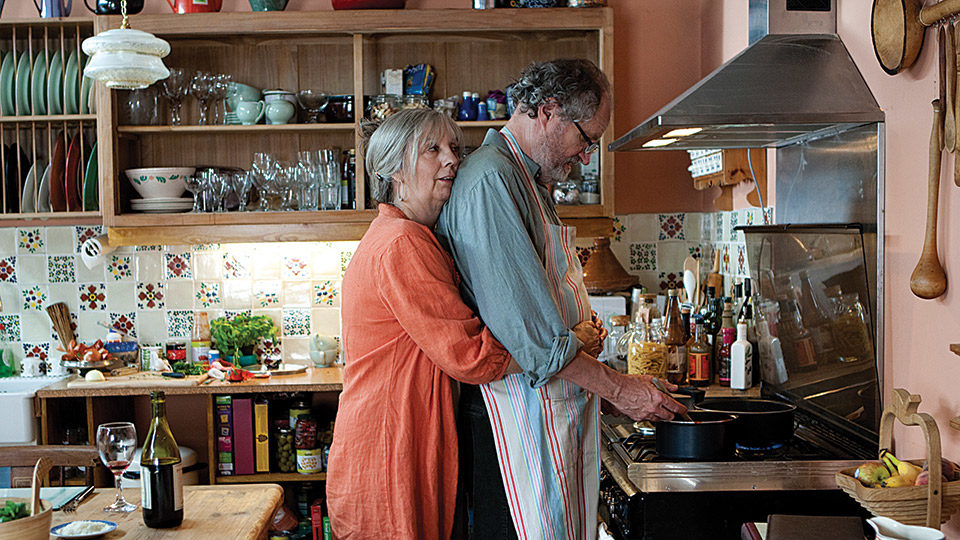
Interestingly, the happiest person on the screen is Gerri, who is far from being a standard beauty. And so she may have escaped that indoctrination because she realized it couldn’t apply to her and so she ignored it.
Yeah, but actually she was also lucky. She met a guy and it worked apparently. I mean there’s luck, too, you know.
What’s radical about the narrative structure is that Mary is peripheral to Tom and Gerri, and the film is located literally in their world—yet, she is the film.
I was experimenting with that and I think it sort of comes off.
Most of the action takes place in Tom and Gerri’s home and on their allotment. You don’t see Mary’s flat, or where Tom and Gerri’s son Joe [Oliver Maltman] lives.
I felt it was important that you don’t. But you learn about them. Mary and Ken talk about their flats and their lives in the kind of obsessive way that solitary people do. But I felt that to see them at home would break the discipline of the film and deflect and dissipate the focus of how and why we see them in the context of Tom and Gerri’s life.
But then, in the last act, you go to Ronnie’s home for the funeral of his wife. And it’s so different from Tom and Gerri’s home.
Yeah, and that’s important. But you’re also looking at a piece of Tom’s history, aren’t you? Also, you can’t beat a good funeral.
It may not be the most apt cue, but what are you up to next?
Well I’m going to do something I’ve never done before. I’m going to redirect one of my old plays, Ecstasy, and then I’m going to create a new play at the National Theater. And we’re trying to raise the money to do a major film about J.M.W. Turner, the painter. I’ve been trying to do this for years. But unlike Topsy-Turvy, where we just got rid of all the exteriors when the budget shrank, you can’t get rid of the exteriors in a film about Turner. I never talk about what I’m going to do, but it’s such a major thing to try and raise money for that it is just as well that everybody knows I want to do it. And also, you never know, because I’d hate anyone else to do it.



